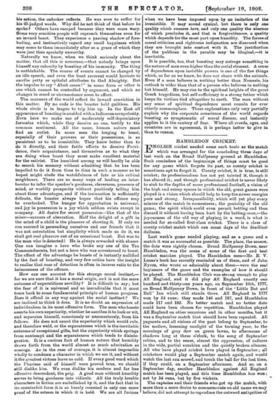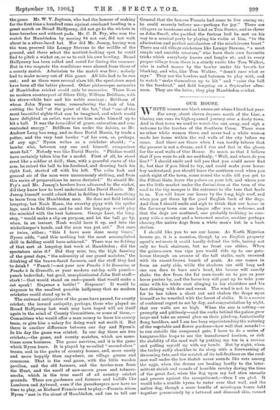HAMBLEDON CRICKET,
ENGLISH cricket needed some such tonic as the match which was arranged for the concluding three days of last week on the Broad Halfpenny ground at Hambledon. Such reminders of the beginnings of things must be good for any game which forgets its past, as county cricket is sometimes apt to forget it. County cricket, it is true, is still cricket; its professionalism has not yet tainted it, though it has altered it; and though professional cricket is never likely to sink to the depths of some professional football, a vision of the high and sunny spaces in which the old, great games were played is a vision which should help to keep the newer energies pure and strong. Irresponsibility, which will yet play every minute of the match in earnestness ; the geniality of the old game; the spirit which could even permit betting and then discard it without having been hurt by the betting-man,—the joyousness of the old way of playing, in a word, is what is needed for so-called first-class cricket. There is a class of county cricket match which can mean days of the deadliest dullness.
Last week's game needed playing, and as a game and a match it was as successful as possible. The place, the season, the date were rightly chosen. Broad Halfpenny Down, near Hambledon, was the scene of some of the first and best cricket matches played. The Hambledon men—Mr. E. V. Lucas's book has recently reminded us of them, and of John Nyren, who wrote so admirably about them—were the real beginners of the game and the examples of how it should be played. The Hambledon Club was strong enough to play AU England, and it did play AU England exactly one hundred and thirty-one years ago, on September 10th, 1777, on Broad Halfpenny Down, in front of the Little Bat and Ball' Inn which still stands there. All England in 1777 won by 54 runs; they made 146 and 187, and Hambledon made 117 and 162. No better match and no better date could have been chosen for repetition. Hambledon played All England on other occasions and in other months, but it was a September match that should have been repeated. All pageants and all visions of the past belong to September, to the mellow, lessening sunlight of the turning year, to the mornings of grey dew on green lawns, to afternoons of shadows long at three o'clock, to the song of September robins, and to the sense, almost the oppression, of sadness in the wide, partial sunshine and the quietly broken silences. All who have played cricket have played in September ; all cricketers would play a September match again, and would watch the last run scored, and touch the bull for the last time, if they could, on a September afternoon. And se, on a September day, another Hambledon against All England match has been played, and this time Hambledon hap won ; not by 54 runs, but by five wickets,
The captains and their friends who got up the match, with more than a mere desire to commemorate an old name we may believe, did not attempt to reproduce the outward antiquities of
the game. Mr. W. Jephson, who had the honour of making for the first time a hundred runs against overhand bowling in a great match on Broad Halfpenny, did not go to the wickets in knee-breeches and without pads. Mr. C. B. Fry, who won the match for Hambledon by sconog 84 not out, did not walk about in a silver-laced hat. Nor did Mr. Jessop, having won the toss, proceed like Lumpy Stevens to the middle of the ground, and there select the nastiest-looking spot he could find to pitch a wicket on, so as to suit his own bowling. Broad Halfpenny has been rolled and cared for during the summer. But in two respects the conditions were altered from those of a county match. Admission to the match was free ; nobody had to make money out of this game. All hits had to be run out ; and as there were several sixes hit, the spectators must have been all the better pleased. Other picturesque memories of Hambledon cricket could only be memories. There lives no modern counterpart of Silver Billy, William Beldham, with his straw-white hair and his noble carriage ; Beldham of whom John Nyren wrote, remembering the look of him cutting the ball " at the point of the bat," that " one of the most beautiful sights that can be imagined, and which would have delighted an artist, was to see him make himself up to hit a ball. It was the beau-ideal of grace, animation and con- centrated energy." Beldham lies under the daisies, as Mr. Andrew Lang has sung, and so does David Harris, by trade a potter, and the very best bowler " of his own, or, perhaps, of any age," Nyren writes as a cricketer should ; " a bowler who, between any one and himself, comparison Must fail." Nobody was like David Harris. "Phidias would have certainly taken him for a model. First of all, be stood erect like a soldier at drill; then, with a graceful curve of the arm, he raised the ball to his forehead, and drawing back his right foot, started off with his left. The calm look and general air of the man were uncommonly striking, and from this series of preparations he never deviated." So should Mr. Fry's and Mr. Jessop's bowlers have advanced to the wicket, did they know how to bowl underhand like David Harris. Mr. Jessop himself would admit that in fielding he had something to learn from the Hambledon men. He does not field behind longstop, but Noah Mann, the swarthy gipsy with his spider legs, used to field there, and he and the longstop would play the mischief with the best batsmen. George Lear, the long- stop, " would make a slip on purpose, and let the ball go by, when, in an instant, Noah would have it up, and into the wicketkeeper's hands, and the man was put out." Not once or twice, either ; "this I have seen done many times," Nyren adds, "and this nothing but the most accomplished skill in fielding could have achieved." There was no fielding of that sort at longstop last week at Hambledon ; did the spectators miss it ? Did they miss, too, the high feasting of the great days, " the solemnity of our grand matches," the drinking of the brawn-faced farmers, mid the stuff they had to drink P "Punch !—not your new Ponche a la Romaine, or Ponche a in Groseille, or your modern cat-lap milk punch— punch bedeviled; but good, unsophisticated John Bull stuff— stark !—.that would stand on end—punch that would make a cat speak ! Sixpence a bottle!" Sixpence! It would be sixpence to the smallest possible halfpenny that no modern cricketer could stand up to it.
The outward antiquities of the game have passed, for county cricket; the inward antiquity, perhaps, those who played on Broad Halfpenny last week may have hoped will set itself again in the mind of County Committees, or some of them,— Committees who would offer a man money to leave his county team, or give him a salary for doing work not worth it. But there is another difference between our day and Nyren's. In his day the game was cricket. In our day there are two crickets,—the game, and county matches, which are some- times mere business. The game survives, and it is the game which Nyren knew. It is played by so-called " second-class " teams, and in the parks of country houses, and, more surely and more happily than anywhere, on village greens and commons. That is the real game, with the little wooden pavilion, and the old farmers, and the terrier-man from the Hunt, and the smell of new-mown grass and tobacco- smoke, which is the true smell of all country cricket grounds. There are gardeners and farmers and bailiffs like Lamborn and Aylward, even if the gamekeepers now have no time to play, as Richard Francis used to play,—Francis, whom Nyren " met in the street of Hambledon, and ran to tell our General that the famous Francis had come to live among us; he could scarcely believe me—perhaps for joy." There are villagers as handsome and as kind as Tom Sueter, and as clever as John Small, who pacified the furious bull he met on his way to a musical party by playing his violin at him, "to the admiration and perfect satisfaction of the mischievous beast." There are old village cricketers like Lumpy Stevens, "a most simple and amiable creature," who have their own favourite tricks which everybody knows and laughs at; and in every proper village team there is a sturdy rustic like Toni Walker, who is called names by the bowler under his breath for blocking, and who, like Tom Walker, " doan't care what ee zays." They are the bowlers and batsmen to play with, and to watch " make themselves up to bit " and raise the ball to the forehead," and field longstop on a September after- noon. They are the heirs ; they play Hambledon cricket.











































 Previous page
Previous page